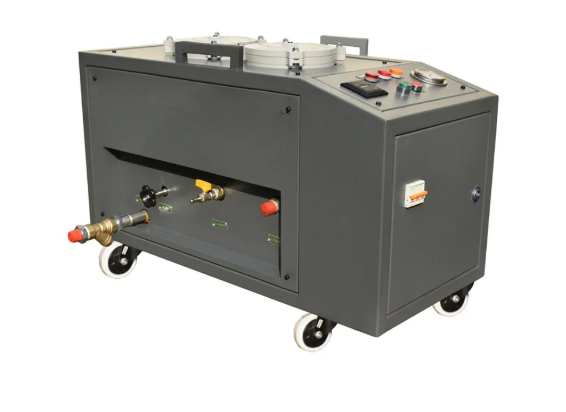Evaluates performance of hydraulic oil filters and purification systems.
WhatsApp : +86 13816217984
Email : info@qinsun-lab.com

Hydraulic oil purification and filtration testers are essential tools for characterizing the performance of fluid cleaning technologies. A common type of tester, particularly for evaluating filter elements, utilizes the multi-pass test principle (standardized by ISO 16889). In this method, contaminated hydraulic oil is continuously circulated from a reservoir, passed through the filter element under test, and returned to the reservoir. As the test progresses, solid particles are continuously injected into the reservoir, and fluid samples are taken from both upstream and downstream of the filter. An automatic particle counter analyzes these samples to determine the number and size distribution of particles. By comparing the upstream and downstream particle counts at different sizes, the filter's Beta ratio (a measure of efficiency) and dirt holding capacity (the amount of contaminant a filter can retain before reaching a specified differential pressure) are determined.
For evaluating purification systems (such as those for removing water or dissolved gases), testers may involve circulating oil through the purification unit and measuring the contaminant levels (water content via Karl Fischer titration or sensors, dissolved gases via gas chromatography or sensors) before and after the process. These testers provide crucial data for selecting appropriate filtration and purification solutions, monitoring their performance, and ensuring that hydraulic fluids meet required cleanliness standards (e.g., as specified by ISO 4406 cleanliness codes).
ISO 16889
ISO 4406
ASTM D7619
ISO 11500
Provides objective, quantitative data on filter performance (Beta ratio, dirt holding capacity).
Evaluates the effectiveness of purification methods in removing water and gases.
Essential for maintaining desired hydraulic fluid cleanliness levels.
Standard compliant test methods, particularly the widely recognized ISO 16889 for filter performance.
Helps predict the lifespan and effectiveness of filters and purification systems in real-world applications.
Crucial for ensuring the reliability and longevity of hydraulic components and systems by controlling contamination.
Facilitates informed decision-making in selecting appropriate fluid cleaning technologies.
Supports quality control and research and development efforts in fluid power and filtration industries.
Filtration efficiency: ≥99% removal rate at 5μm particle size
Pressure drop: Initial to maximum allowable value
Contaminant holding capacity: Retention rate per unit mass
Particle count: Classified according to ISO 4406
Moisture content control: ≤100ppm
Flow rate reduction: <5%
Temperature adaptability: Stable from -20°C to 80°C
Compatibility testing: Filter media and oil reaction
Durability assessment: Simulates performance during the service life cycle
System simulation parameter monitoring: Ensures long-term oil wear and failure prevention

Qinsun Instruments Co., LTD is a professional laboratory testing instrument manufacturer in China,Have been focusing on laboratory instrument R&D more than 30 years and have rich industry experience,Based on international testing standards,We are also the instrument supplier for BV SGS laboratory,We provide one-stop solutions for lab instruments,Free Training and Turn-Key Service,Products exported all over the world,Offer 36 month warranty and are a trustworthy partner.
Company Phone
+86-21-6420 0566
Working hours
Monday to Friday
Mobile phone:
13816217984
Email:
info@qinsun-lab.com
